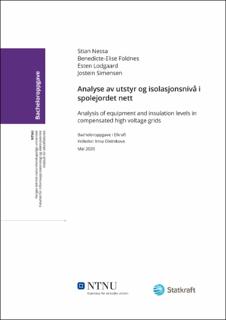Analyse av utstyr og isolasjonsnivå i spolejordet nett
Bachelor thesis
Date
2020Metadata
Show full item recordCollections
- Institutt for elkraftteknikk [2474]
Abstract
Formålet med denne avhandlingen er å få en oversikt over- og analysere ulike normer og forskrifter som omhandler utstyr og isolasjonsnivå i norske spolejordet nett. Resultatet av avhandlingen vil bli brukt til å komme med en anbefaling for isolasjonsnivå i 132 kV spolejorda nett.
Litteraturstudie, simulasjoner, analyse av case og tett kontakt med fagfolk i bransjen har blitt brukt til å komme med en konklusjon i denne avhandlingen. Case-studiet ble brukt til å simulere et ekte, men anonymt nett fra Statkraft, og det ble laget anbefalinger for isolasjonsnivå og overspenningsavledere basert på simulerte og tilgjengelige verdier. Relevante normer og forskrifter ble også brukt under diskusjonen av isolasjonsnivå.
Norske forskrifter sier at en jordfeil må bli klarert innen 2 timer i et 132 kV spolejordet nett. Statnett sin veiledning sier at et anlegg må dimensjoneres for å tåle en jordfeil med varighet på 8 timer. Internasjonale standarder sier at isolasjonsnivået må bli dimensjonert fra feilspenningen som kan oppstå ved en jordfeil, hvis jordfeilen kan ligge inne i en lang tid. Det betyr at for isolasjonskoordineringen er det nødvendig å definere den kontinuerlige driftfrekvente spenningen som verdien for temporære overspenninger når jordfeilen har en lang varighet og en høy jordfeilfaktor.
Gjennom litteraturstudie ble det funnet en rekke begreper og definisjoner som blir brukt forskjellig og misforstått i bransjen. Definisjonene ble oversatt til norsk og satt i en oversiktlig tabell.
I et nett med høy jordfeilfaktor og uten automatisk jordfeilutkobling, vil en få ett høyt jordpotensial langs de friske fasene. Basert på de nasjonale og internasjonale veiledningene og standardene, vil det i noen tilfeller være nødvendig å øke isolasjonsnivået til det neste høyere nivået. The purpose of this thesis is to review and analyse the different norms and regulations regarding equipment and insulation levels in Norwegian compensated grids. The result in the thesis will be used to make recommendations for insulation levels in 132 kV compensated grids.
Literature studies, simulations, case analysis and close contact with the industry have been used to come up with a conclusion for this thesis. The case study was used to simulate a real but anonymous grid from Statkraft, and there were made recommendations for insulation level and surge arresters based on the simulated- and available values. The regulations and norms found were also used in the discussion of the insulation level.
Norwegian regulations states that an earth fault needs to be cleared within 2 hours for a 132 kV compensated grid. Statnett's guidelines states that a grid must be dimensioned for having earth faults with a duration of 8 hours. International standards say that the insulation level must be dimensioned from the fault voltage that can arise from an earth fault if it can remain in the system for a long time. Which means, for insulation co-ordination, it's necessary to define the continouos power-frequency voltage as the value of the temporary overvoltage when the fault has a long duration and a high earth fault factor.
Through the literature study there was found multiple terms and definitions that was used differently within the industry. These terms were translated into norwegian and organized into a table to get a good overview.
In a grid with a high earth fault factor and without earth fault clearance, there will be a high fault potential across the healthy phases. Based on the national and international guidelines, and standards, in some cases it will be necessary to raise the insulation level to the next standard level.
